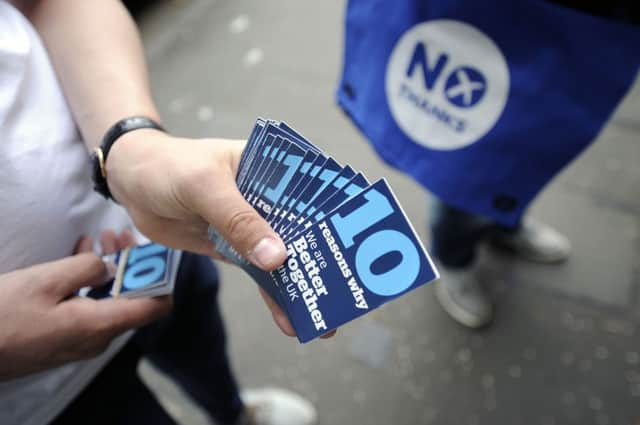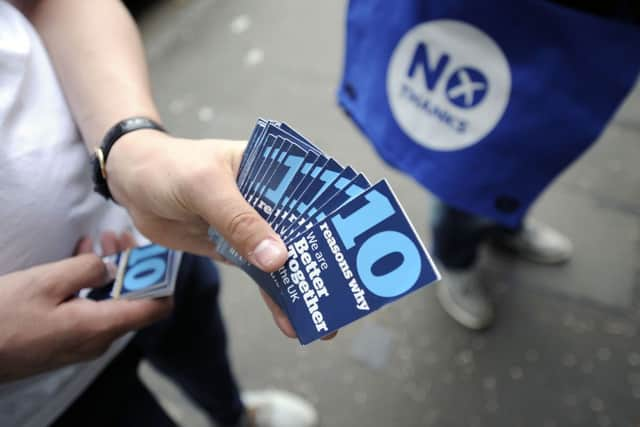Play fighting on Better Together campaign trail


With an option of carrying their leaflets in royal blue or bright red bags emblazoned with the “No” logo, the colour choice is a significant one for the group - most of whom are paid-up members of either the Labour or Conservative parties.
But the arguments are all in jest.


Advertisement
Hide AdAdvertisement
Hide Ad“We actually all wore each other’s party colour bags on one outing to make the point that the campaign has nothing to do with what political party we support,” says Phillip Charles, 41, an oil industry worker from Glasgow and a Tory. “We have a bit of banter about it and we might not agree on party politics, but we are united in this. It’s all in good fun.”
Fellow campaigner Miriam Smith agrees: “A lot of people seem to mix up the No campaign with being Conservative or Labour, but that is not the case,” she says.
The group is out campaigning on the streets of Govan, a stronghold for the No side, with a solid Labour-supporting demographic.
The Blue Star Social Club on Lorne Street boasts a “No Separation - UK OK” banner on its faded facade, while posters supporting the Better Together campaign are a common sight in household windows.
The Govan residents are, however, braver than some of the campaigners themselves.
“I haven’t even got a poster up in my own window at home - I don’t want it to be smashed,” says former teacher Miriam, who lives in Newton Mairns.
She knocks at the first door - a detached house in a small modern development. There is no answer.
“That’s a good sign,” says Miriam, optimistically. “They’re probably out working and therefore would be worried about their jobs in an independent Scotland.”
Advertisement
Hide AdAdvertisement
Hide AdFew people are at home during the group’s afternoon campaign session. The first woman to answer their knock gives the group short shrift: “We’re a yes, I’m afraid,” she says, closing the door. The campaign ranks people on a five point scale - with one a strong “no” and five a definite “yes”. Miriam reports back to the group’s leader, who is standing on the street with a clipboard and a list of potential voters.
At this stage in the campaign, those who have during previous canvassing sessions already expressed a strong leaning towards the opposition are not visited a second time - with the focus put on the floating voters and householders who they have not yet managed to contact.
“There is no point trying to sway them if their minds are made up,” says Miriam. “We’re better spending our time talking to people who are undecided.”
For the remainder of the afternoon, however, almost all of the people they speak to are ‘No’ supporters.
“Sometimes it’s like that and sometimes it’s the opposite,” says Phillip. “I went out the other day and didn’t have a single ‘No’ supporter. The next day, it was more than 90 per cent ‘No’. It just depends.”
But, despite finding few people at home during certain campaign sessions, resulting in a lot of fruitless walking, the Better Together team is tireless. Many of them say they often take part in three campaigning sessions a day - morning, afternoon and evening - traipsing up and down the never ending Glasgow tenement stairs.
“You are tired, but you get used to it,” says pensioner Gregor Morgan, who the previous day had put in a ten hour stint on the campaign trail.
“I was born into the UK and someone is trying to take my citizenship away from me. I couldn’t just stand back and watch independence happen.”
Advertisement
Hide AdAdvertisement
Hide AdHe adds: “I don’t understand how people can think it’s a good idea to go across to independence just because we have had four years of a Westminster Tory government - it’s a bigger picture than that.”
The head of the local campaign group is 20-year-old Kyle Thornton, a former chair of the Scottish Youth Parliament, who is studying politics and central and eastern European studies at Glasgow University.
“Once my term at the Youth Parliament ended in July, I got involved in the campaign,” says Kyle, who lives with his parents just a few streets away from the area where he is campaigning.
“I make sure we do two to three sessions a day, moving from area to area within this ward. We’ve seen a lot more people join the campaign in recent weeks - as it gets closer, people are signing up. They want to help make sure that this does not happen.”
The group admits that, compared to the radical change promoted by the Yes campaign, trying to impassion members of the public with a vote for an existing system is less romantic - and therefore more difficult.
But left-leaning Oxford University student Michael Low, 19, who has returned home to stay with his parents in Glasgow for the duration of the campaign, disagrees.
“What we are asking them to vote for is not the status quo,” he says quickly. “What we are offering is a vote for further devolution, which has been promised by all three parties.”
The group disagrees over the best tactics to sway voters on the doorstep. Kyle takes a softly softly approach, telling people the positives of remaining part of the United Kingdom.
Advertisement
Hide AdAdvertisement
Hide Ad“We say that we love our country and we think the best thing for Scotland is to stay in the union,” he explains.
But Miriam prefers a no nonsense tack.
“I’m the opposite,” she says. “I tell them ‘Make sure you do this, or else’. They need to know the risks.”
One householder who says he is fully aware of the risks is 34-year-old Ali Abbas, who fears that his employer - a large bank - will move his job south of the border in the event of a Yes vote.
“I know that if Scotland becomes independent, they will move it all back to England and then what choice will I have?” says Ali, who lives in a tenement flat with his wife Tayyaba, son, Shah, seven, and four-year-old daughter Dua. “I don’t want to move, I am happy here and my family is happy here. I have done my research - I have spoken to people and I have attended a few local meetings discussing the impact of the referendum and I don’t think there is any way I could be convinced that it is a good idea.”
Walking past the District Bar on Paisley Road West, the landlord, David Currie, comes out to shake the campaigners’s hands.
“I’m voting no, of course,” he says. “I think there’s only one ‘yes’ voter in my entire pub. Finance is my main worry - job security and the pound. It’s a million things.”
But others are not always so friendly.
“We’ve been shouted at on the street before,” said Phillip. “It’s not nice, but I try not to be bothered. I just say to them: ‘I’m a Tory living in Glasgow, do you think I’ve not been abused before?’”
SEE ALSO